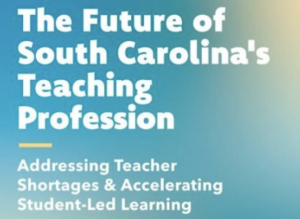USC research calls for long-term strategy to address teacher shortages
November 30, 2022A University of South Carolina research team’s new report suggests that the state does not need another series of programs, but rather a new strategy, to truly change the future of teaching. The report showcases evidence of what is and is not currently working for the teaching profession, innovations already underway in certain school districts, and insight from South Carolina educators who are ready to evolve teaching and learning in South Carolina. Read the report at bit.ly/FutureofSCTeaching.
With funding support from the Carnegie Corporation of New York, a team of researchers at the USC College of Education released the report, The Future of South Carolina’s Teaching Profession, focusing on the current state of the teaching profession in South Carolina. It offers suggestions to alleviate the teacher shortage challenge while addressing student-led learning.
The report also provides background for legislative action in the 2023 session. In January 2023, Senator Greg Hembree (R-Horry, Dillon) and Representative Tim McGinnis (R-Horry) will lead three policy sessions with local and state leaders. These sessions, using data supplied by the report, will complement the efforts of the Teacher Recruitment and Retention Task Force established in the state budget.
Hembree says, “It is time to stop nibbling around the edges of school reform and the teaching profession. This report is an action-oriented effort to jump-start the conversation.”
Over the last nine months, the USC College of Education research team, led by Barnett Berry, Debra Hamm, and Lesley Snyder, worked with a small group of advisors while conducting focus group interviews with almost 100 South Carolina teachers and principals. The team also partnered with Charleston, Fairfield, and Pickens county school districts to better understand the challenges and innovative practices in these school districts.
“The real challenge addressed in this report is the nature of the teaching job,” says Berry. “The challenges facing the education profession will require a shift in mindsets around the role of teachers and administrators. It will require significant technical and policy changes in how educators are prepared, used, recognized, and rewarded. It will require a deeper understanding of teacher working conditions, new ways to capitalize on South Carolina’s many expert teachers, and strategic work currently underway.”
The research findings present “what is” and “what could be” elements that shape a framework for evolving the teaching profession. The recommendations focus on teacher recruitment, professional learning, teacher leadership, compensation, and more. Among the recommendations are (see page 15 of the report for the entire list):
- Base salary competitive with those of similar professions and salary increases and supplements based on expanded roles, expertise, accomplishments.
- Expanding and creating roles for teacher leaders with compensation tied to advancement. As one district teacher of the year noted in the focus group, “It’s not like [teachers] don’t have the ideas, but sometimes administrators don’t necessarily know how to facilitate … or empower teachers to hop in and work on some of their ideas.” (see page 30)
- Teacher evaluation reconceptualized as a tool for improvement and peer learning, fueled in part by micro-credentials.
- Customized induction to the work of new teachers, built-in time for mentoring, use of virtual networks to access expertise anytime. As one district teacher of the year shared in the focus groups, “My mentor was a retired kindergarten teacher when I was a new high school teacher. She was excellent, but could not help me teach my subject to my students.” (see page 23)
Additionally, the report highlights innovations already in place in the three partner school districts. These include creatively repurposing substitute dollars, creating a teacher village, building community through teacher residencies, and connecting with global communities for building a stronger teaching profession.
The Carnegie Corporation has awarded USC a second grant to continue to build out the strategy.
Read the report summary at bit.ly/FutureofSCHighlights and the full report at bit.ly/FutureofSCTeaching.




















